15+ Redditors Stand Up For A Boy Who Gave Away His Brother's Pet Hamsters
It is very easy to convince your parents to get you a pet to play with. Even if you have a strong will to take good care of the pet, it is relatively challenging to abide by it.
Once you get a pet, for the first few days or even a few weeks, you seem to take really good care of the little one and even feel proud of taking on their responsibility. But as time goes by, it is human nature to get bored of doing the same thing repeatedly, especially if a child takes care of a pet that is nothing more than a new toy to play with.
It is the responsibility of the parents to either not give in to their child's request for a pet, or if they cannot help but buy one, then they must be responsible for it because pets are living creatures after all. Once you realize you cannot take good care of the pet or feel uncomfortable with it, the best thing to do is give it away to someone who will take good care of it.
You can visit them occasionally, but once you give away the pet, it is entirely unfair and unjustified to ask to take it back again.
Giving away the pet hamster of the younger brother who didn't care for them after a while.
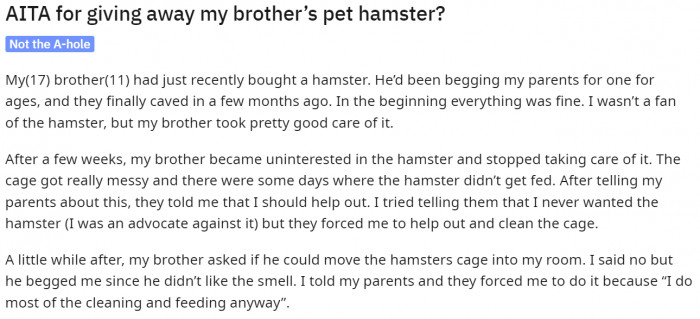
Asking for the hamster back after giving it away is unfair to the new owner.
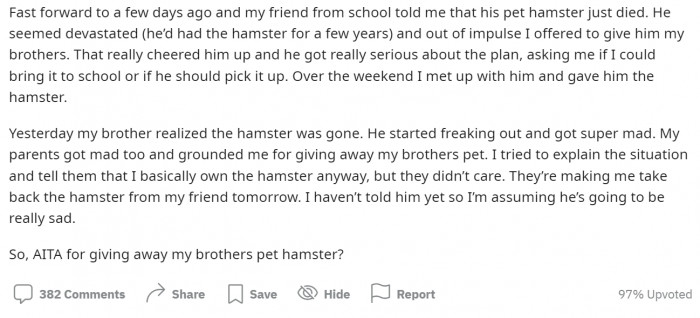
Once the brother abandoned the hamster, it was entirely his responsibility to give it to someone who would care.
.

Child Development and Pet Ownership
Pets can play a significant role in the development of children, fostering empathy and responsibility.
Research in developmental psychology indicates that children who engage with pets often develop stronger social skills and emotional intelligence.
This situation illustrates how giving away a pet can disrupt this developmental process, leading to emotional distress for the child.
Understanding Family Dynamics
Family dynamics can become challenging when members have differing views on shared responsibilities. In this case, the conflict arises from a child's decision that impacts others, leading to frustration and anger from family members.
Research from the Journal of Family Psychology emphasizes how differing values and expectations can lead to misunderstandings and conflict within families.
Sibling Dynamics and Responsibility
Dr. Jason Ford, a developmental psychologist, explains that sibling relationships often involve complex dynamics around responsibility and ownership.
Research indicates that siblings frequently navigate issues of fairness and entitlement, which can lead to conflicts.
Understanding these dynamics is crucial for fostering healthier sibling interactions.
We shouldn't do anything because of family pressure.
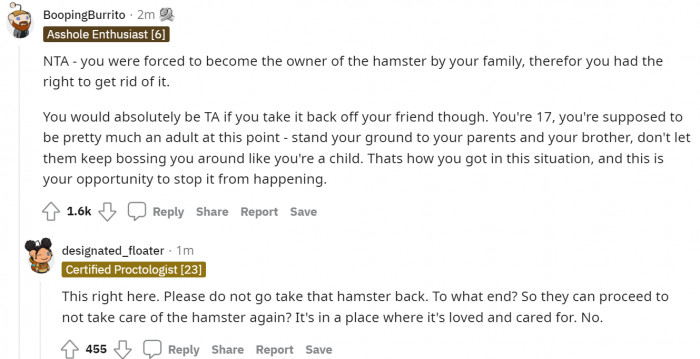
Demanding that the parents take care of the hamster when it comes back is fair.
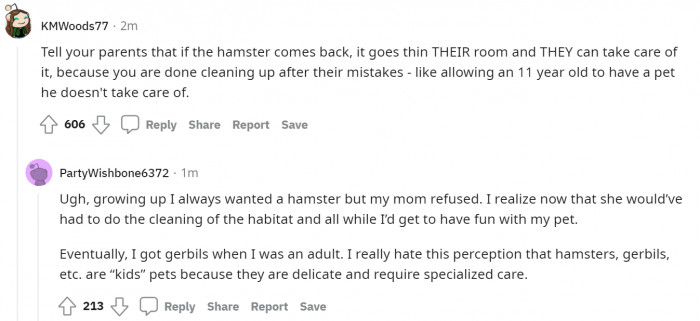
When you are taking care of the hamster, it technically becomes yours.

Dr. Michelle Thompson, a child psychologist, notes that children often form deep emotional bonds with their pets, which can complicate family dynamics when these pets are given away.
Understanding the emotional significance of pets in children's lives is essential for parents navigating such decisions.
Emphasizing open communication about feelings can help mitigate the impact of these decisions.
Moreover, the emotional attachment that family members have toward pets can complicate these dynamics further. Pets often represent family members themselves, leading to strong emotional reactions when disagreements arise.
Studies suggest that emotional bonds can significantly influence decision-making processes, often prioritizing familial attachments over other considerations.
From a psychological perspective, the decision to give away a sibling's pet can evoke feelings of betrayal and anger.
Studies show that siblings may perceive such actions as a direct threat to their autonomy and emotional security.
Recognizing these emotional responses can help siblings navigate their feelings more effectively.
It's better for the hamster to live with someone else than to die with the brother.

Caring for your child is okay, but not at the expense of another innocent creature's life.

Pets are a source of entertainment and, most importantly, a living source of companionship.
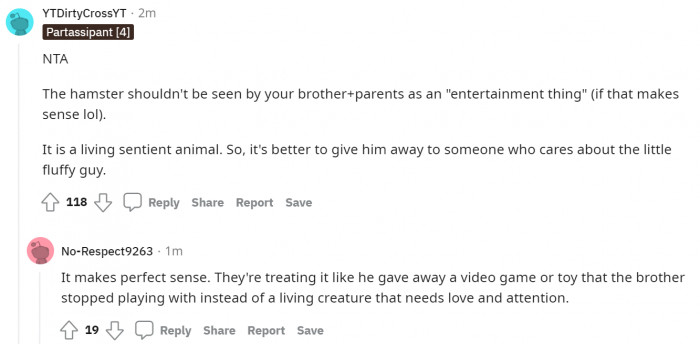
The Emotional Impact of Losing a Pet
The loss of a pet can trigger profound grief in children, comparable to losing a family member.
Studies show that the grieving process in children can vary significantly, often influenced by their developmental stage and attachment to the pet.
Recognizing the importance of this loss is crucial for parents to support their children through the grieving process.
The Concept of Ownership and Responsibility
Ownership of pets often comes with a sense of responsibility that can vary significantly among family members. In this case, the child's decision to give away a pet without consulting others reflects a lack of shared accountability.
Research indicates that when responsibilities are not clearly defined, it can lead to feelings of resentment and frustration among family members.
The Role of Communication in Sibling Relationships
Effective communication is essential in resolving conflicts among siblings.
Research published in the Journal of Family Psychology indicates that open dialogue can alleviate tensions and promote understanding.
Encouraging these discussions can help siblings feel more supported and heard.
Well, how can someone be wrong for rescuing an animal and giving it a safe and good environment?
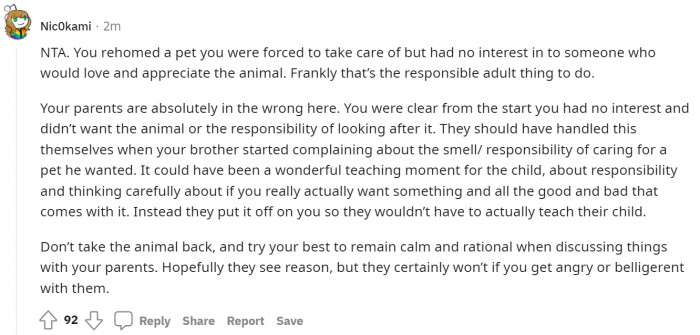
If the hamster comes back, then the responsibility should be equally shared by all.
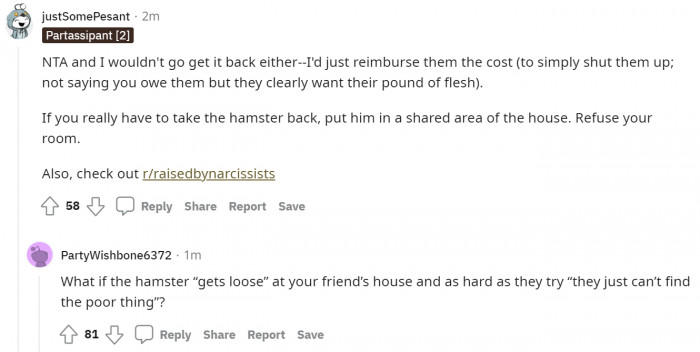
We have every right to do whatever we want with our pets, for their good.

To help children cope with the loss of a pet, parents can implement strategies such as open discussions about feelings and creating memorials.
Research indicates that validating children's emotions and encouraging expressions of grief can facilitate healing.
Engaging in rituals can help children process their feelings and find closure.
Establishing clear expectations regarding pet care can foster a sense of teamwork and shared responsibility. According to studies published in the Journal of Applied Animal Welfare Science, having a clear understanding of roles can significantly reduce conflict and enhance family satisfaction.
Moreover, sibling relationships often reflect broader family dynamics that shape individual behaviors.
Studies suggest that family interactions can influence how siblings perceive fairness and responsibility.
Acknowledging these influences can aid in resolving conflicts and fostering cooperation.
Since it was forced on him, he just wanted to give the poor hamster a better life.

He tried to give the hamster a better life by giving it away.
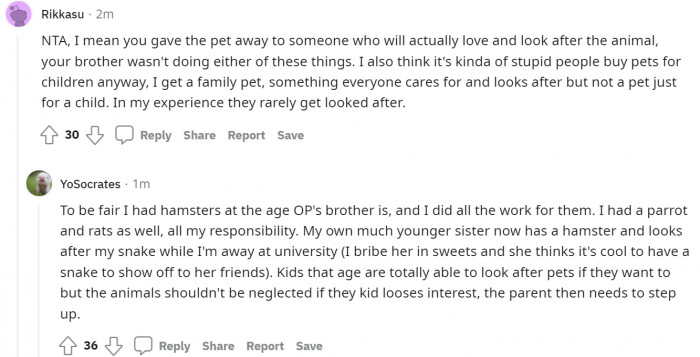
When the original owner is irresponsible, someone has to step up to do the right thing.
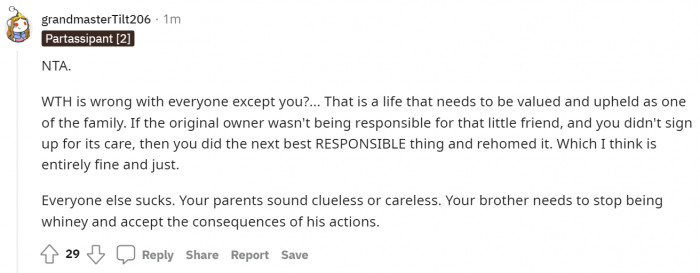
Fostering Responsibility Through Pet Ownership
Pet ownership can teach children valuable lessons about responsibility and empathy.
According to research in educational psychology, children who care for pets often develop a sense of accountability and nurturing.
These experiences can form the foundation for future relationships and social interactions.
Navigating Emotional Reactions
Emotional reactions are natural responses to conflicts within families. When individuals feel their values are being challenged, it can lead to feelings of anger, hurt, or disappointment.
Research indicates that acknowledging these emotions is crucial for resolution, as suppressing or ignoring them can lead to further misunderstandings and resentment.
Setting Boundaries and Expectations
Establishing clear boundaries is crucial in maintaining healthy sibling relationships.
Research shows that siblings who communicate their expectations tend to experience less conflict and more supportive interactions.
This clarity can empower siblings to set limits that protect their emotional well-being.
He should have consulted before giving it away, but what he did was absolutely the right thing.

He should definitely not ask for the hamster back, as it is in a better place.
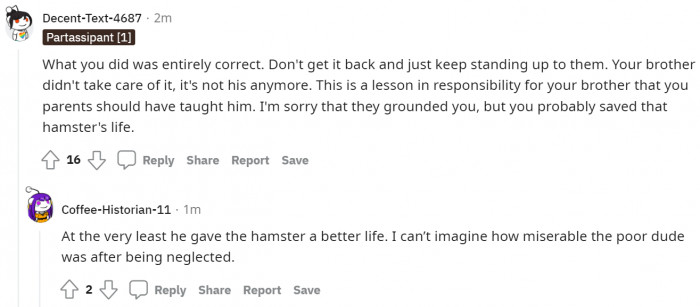
He should have told his brother or parents indirectly and politely, and maybe they would have agreed.

Encouraging family members to express their emotions constructively can promote healing and understanding. By fostering a compassionate environment, family members can navigate their feelings and work toward resolution.
Ultimately, promoting emotional awareness can enhance family relationships and facilitate healthier resolutions to conflicts.
Additionally, understanding the emotional landscape surrounding sibling conflicts can enhance empathy and reduce friction.
Psychological studies indicate that when siblings recognize each other's feelings, they are better equipped to navigate tensions and promote harmony.
This empathetic approach can lead to healthier interactions among siblings.
What the boy did was quite logical.
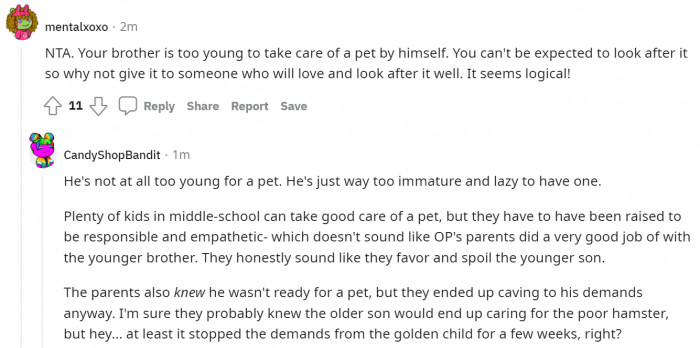
People who cannot take on the responsibility of pets shouldn't be allowed to have them.

It is quite sad to see that the parents cared about their child's unnecessary rant over a hamster that he couldn't even care for more than the hamster's life itself. Share this story with friends and family, especially those with pets, and encourage them to stand up for a voiceless living creature because it cannot do so for itself.
Coping with Conflict
Coping with conflict in sibling relationships requires emotional resilience and support.
Research from the University of Minnesota indicates that individuals who cultivate strong support networks tend to fare better in the face of sibling disputes.
Building these networks can provide the emotional backing necessary to navigate difficult situations.
In summary, navigating sibling dynamics requires understanding the emotional complexities involved.
By fostering open communication, setting boundaries, and developing emotional resilience, siblings can enhance their ability to manage conflict.
This approach can lead to a more supportive environment and healthier relationships.
Psychological Analysis
This situation illustrates the complexities of sibling relationships and the emotional factors that often underpin conflicts.
Addressing these deeper issues can lead to more constructive resolutions and healthier dynamics among siblings.
Analysis generated by AI
Analysis & Alternative Approaches
Research highlights the importance of understanding emotional dynamics in sibling relationships.
When siblings take the time to communicate openly and set boundaries, they can navigate conflicts more effectively and build stronger bonds over time.
The Importance of Communication
Effective communication is essential for resolving conflicts within families. When family members feel safe expressing their thoughts and emotions, it can create an environment conducive to understanding and resolution.
Research from the American Psychological Association emphasizes the importance of open communication in promoting healthy family dynamics, particularly during significant life changes.
Establishing regular family meetings can provide a structured space for discussing concerns and feelings. This proactive approach allows family members to address issues before they escalate, fostering a supportive atmosphere.
Ultimately, creating a space for open dialogue can help family members navigate their feelings and find resolutions that accommodate everyone's needs.
Finding Common Ground
In any family conflict, finding common ground can be a powerful tool for resolution. When family members identify shared values or goals, it can foster a sense of unity and collaboration.
Research from the Journal of Conflict Resolution indicates that focusing on commonalities rather than differences can significantly reduce tension and promote constructive dialogue.
Analysis & Alternative Approaches
Family conflicts, especially concerning shared responsibilities for pets, can evoke strong emotions and reveal underlying tensions. However, with open communication, empathy, and a focus on shared values, families can navigate these challenges more effectively.
Ultimately, fostering understanding and compassion can strengthen familial bonds and promote healthier relationships.
Analysis & Alternative Approaches
In conclusion, the emotional and developmental implications of pet ownership are profound.
Understanding the significance of these relationships can help parents navigate the complexities of pet ownership and its impact on children.



